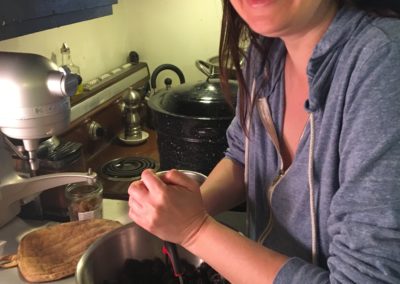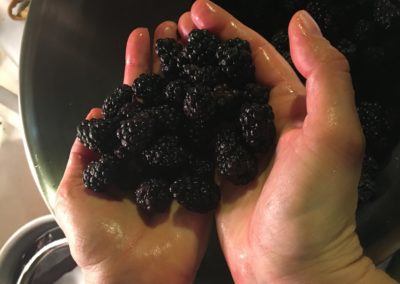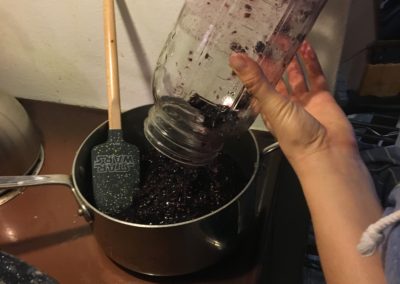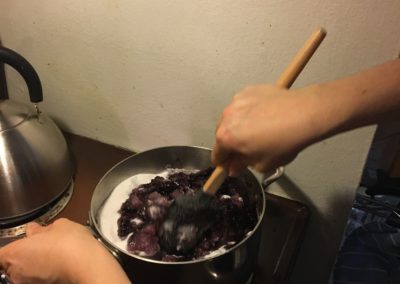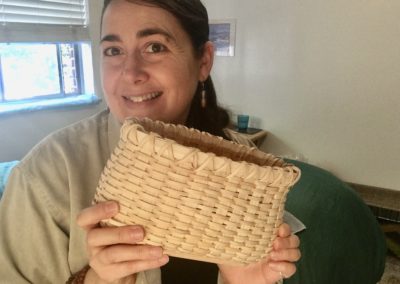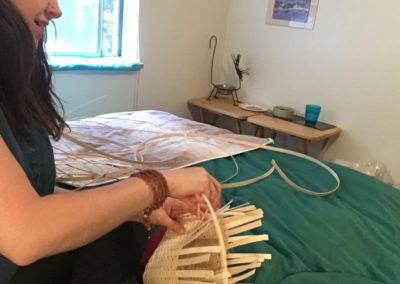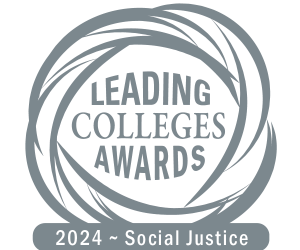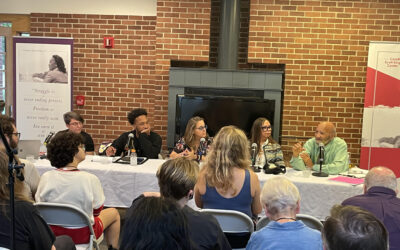Since the end of March, the Antioch College community has been scattered across the country and sheltering during the COVID-19 pandemic. While the effects of COVID-19 have tremendously impacted our way of life and work, our students, faculty, and staff are finding new and creative ways to realize the College’s “three C’s” of Classroom, Co-op, and Community, remotely.
THE TRANSITION TO REMOTE LEARNING
Téofilo Espada-Brignoni, visiting assistant professor of Psychology, explains that, “the transition [to remote teaching] was a bit tough at first. Due to the uncertainty of the situation, and our unique academic calendar, we had to move the last week and a half of Winter quarter classes online. Then, we had to transition the courses for the Spring to a fully online environment.”

Téofilo Espada-Brignoni’s remote campus. He says, “The flute is just for me, to play a song every now and then to relax a bit.”
The decision to move classes online came on March 11, 2020, with the decision to shift the final week of classes online in order to maintain the safety of the Antioch community as well as the community of Yellow Springs. Further actions included that personnel maintain social distancing; that employees avoid events, gatherings, and travel; the closure of Residence Halls with the exception of certain individual cases; the switch to online teaching/learning for the entirety of Spring term; and the formation of a special task force designated to track COVID-19.
Like many students, Maria Ramirez ’22 found the shift to remote learning troublesome at first. “Everything is starting to feel like a really long episode of the Twilight Zone… tun tun tun tun tun,” she says. “I’ve been trying to look on the bright side lately, trying to adjust to this new lifestyle of 24/7 quarantine with my family.”
Although the situation can be stressful and anxiety-inducing, being in a class via video conference also offers comical moments. “I can sense it in my bones,” Maria says, “my mom is going to end up yelling at me in Spanish mid-class about something I did months ago or at the TV while watching the news. The professor is about to be all types of shook.”
VIRTUAL PRACTICUM COURSE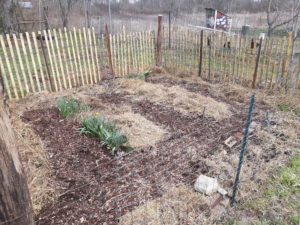
As a direct response to the epidemic, Kat Christen, Farm manager and educator, and Beth Bridgeman, assistant professor of Cooperative Education, developed the virtual course “Victory Gardens,” a practicum course guiding students to create and care for their own food-producing garden.
“Spending time talking about and encouraging gardens and growing food during this time has been really enjoyable for me… it’s great to be able to support our students in terms of health and wellness and skill-building while so many are stuck at home. Skills they learn in this course can stay with them no matter what their future path may be,” says Kat. “For 15 years, I have been an eco-farmer and educator, so at this unprecedented time, I really wanted to share my experience and passion for growing with our community.”
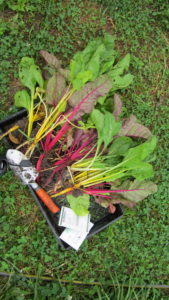 Beth Bridgeman explains she has been very pleased to work together with Kat to develop and teach this online experience. In addition to Victory Gardens, Beth has been teaching two experiential reskilling courses and continues to be impressed by the creativity and resilience displayed by her students. “My students have been very creative in the way they work on these (courses) and then present them to me,” she says.
Beth Bridgeman explains she has been very pleased to work together with Kat to develop and teach this online experience. In addition to Victory Gardens, Beth has been teaching two experiential reskilling courses and continues to be impressed by the creativity and resilience displayed by her students. “My students have been very creative in the way they work on these (courses) and then present them to me,” she says.
For example, Christin Severini ’22 has been studying preserving and canning (making jam and pasta sauce), bread-making, candle-making, and tincturing, among other things. To further her learning, she has read and reviewed The Good Life Lab: Radical Experiments in Hands-on Living and Your Money or Your Life and viewed and discussed the documentary Fantastic Fungi.
Another student, Alexa Greer ’23, has been studying indoor gardening: building three different types of indoor greenhouses and experimenting with various lighting techniques.
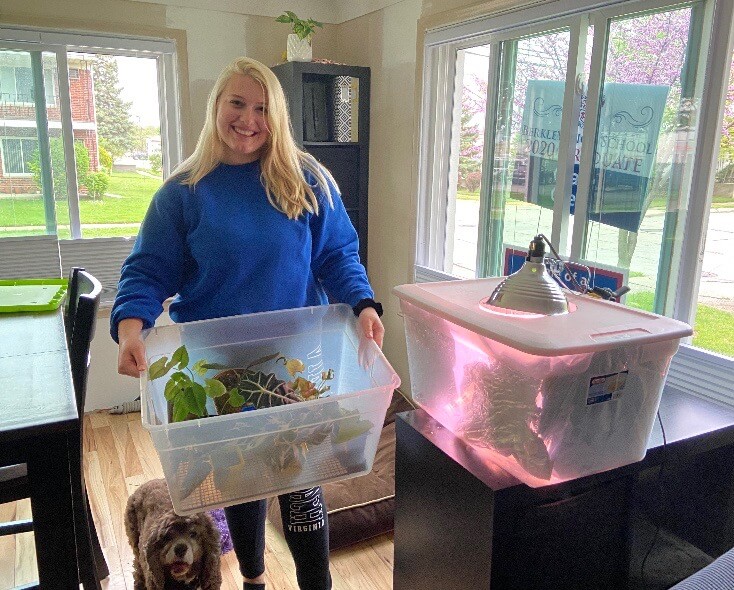
Alexa Greer ’23
Beth explains that both Alexa and Christin have submitted videos of themselves in action for some of their assignments, written reflection, and blogging for others.
Similarly, Téofilo explains that his classes have been “going well, for the most part. Students are working hard, and in the Antioch Seminar, students have been incredibly creative. I’m proud of my students. They are resilient, and I’m honored to be part of their education.”
CONNECTION AT A TIME OF DISCONNECTION
Due to the nature of remote education, to a certain degree, there exists a lack of connection. Téofilo and Beth agree that it is this aspect of teaching that they miss the most: the sense of community that is present at Antioch College. Beth explains she misses the community-building aspects of commensality.
“My courses on campus always include making food together and eating together over discussion at the end of class. This food-sharing component is a powerful means of building community. I hope to do this remotely in the last week of class; each of us will make tea and snacks and ‘eat’ together, but it won’t be the same.”
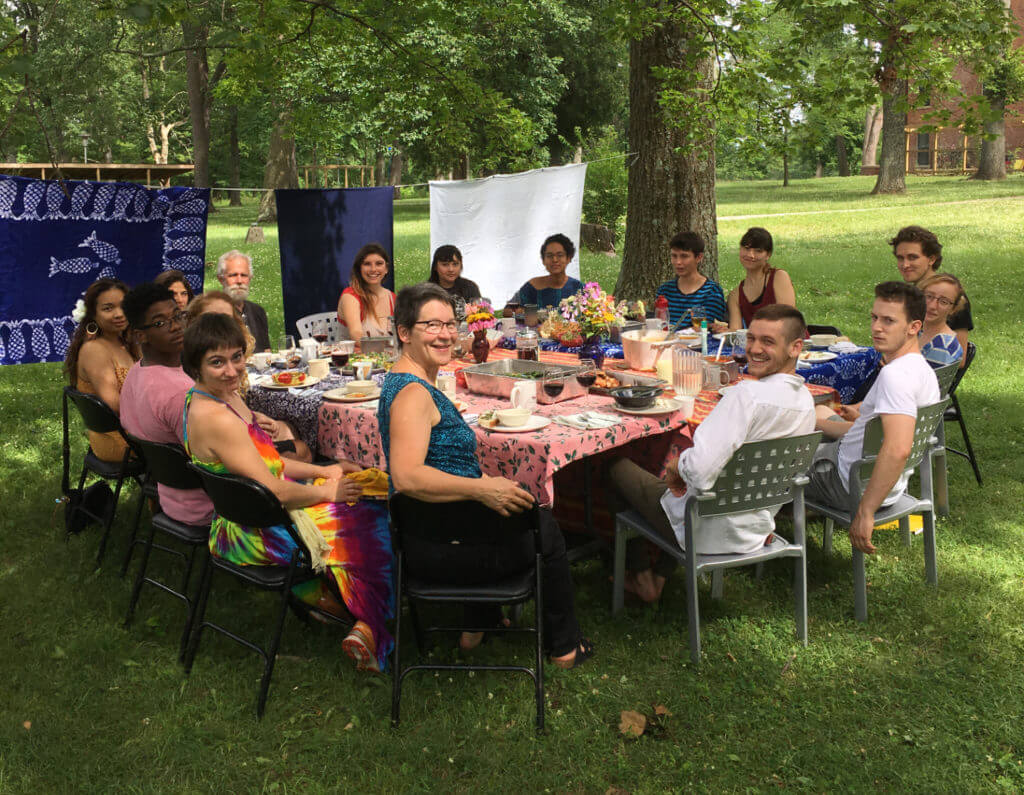
In normal terms, Professor Beth Bridgeman incorporates “commensality”, (the act of breaking bread together), into all of her courses as a means of community building. This was the final class from the 2017 “Food, Farming and Resilience” course.
Reflecting upon positive outcomes of the current situation, Beth says, “I think that students have felt strong support of them, our willingness to be flexible in an extraordinary time, and our desire for them to succeed. In this way, I think that student-faculty connection has sometimes been strengthened.”
At this moment, the coronavirus pandemic has forced many institutions across the globe to experiment with remote teaching, and there are many indicators that our way of life is about to change. If the global experiment with remote teaching proves to be successful, education could be one aspect of life that faces transformation at some level.
In an article for Counterpunch, Karl Grossman ’64 argues that the COVID-19 pandemic can lead to a new and better world. He quotes Indian writer Arundhati Roy, who writes:
“Historically, pandemics have forced humans to break with the past and imagine their world anew. This one is no different. It is a portal, a gateway between one world and the next.”
Two months into remote teaching, Téofilo and Kat reflect on what they find to be the biggest obstacle(s) to remote teaching. Kat has found virtual communication to be tricky at times. She writes, “It is harder to read body language to know when someone wants to say more, but as we get more familiar with the tech, like muting and unmuting, it’s getting better. The chat function is helpful to take questions and get feedback in real-time on student interest. We wouldn’t be able to do that in person—it would be disruptive to class discussions.”
“I think the biggest problem was figuring out ways of delivering our students the best possible learning experience while dealing with the uncertainty of an unprecedented public health crisis,” explains Téofilo. “However, being able to see the students through the screen and continue the challenging yet meaningful journey of a college education has been rewarding. It is something that would not have been possible a couple of decades ago. In a way, we are privileged to have a technological infrastructure that allows us to stay connected and continue our in-depth exploration of our world. It’s not a perfect infrastructure, and many individuals have limited access to the internet or the necessary or adequate devices. But the College has done a good job figuring out how to support students who didn’t have access to technology.”
TOOLS FOR DIGITAL LEARNING
Student DJ Reiley ’23 is on Co-op this quarter in the Antioch College IT department. Working with April Wolford ’92—who has three decades of experience in education technology— DJ has delivered a suite of tools, training, and support systems to assist faculty in successfully delivering the curriculum remotely.
Support for technical questions and to develop solutions to specific needs are available to members of the campus community via email or video appointments.
DJ has created a new internal website consolidating College resources for digital teaching and learning, as well as academic computing. The site includes “how-to” video guides created by April and DJ, compiled computer and academic technology available on campus, and resources available through the Great Lakes Colleges Association.
ENGAGING VIRTUALLY IN COMMUNITY
Distance engagement extends beyond classroom and Co-op to include community this term. Both ComCil and College Council continue their work with video conference meetings. And Community Meeting brings all students, faculty, and staff together via Google Meet rather than in McGregor 113. To help connect, ComCil Co-Presidents Chris Chavers and Noah Greer facilitate a “good and welfare” circuit where all participants have the opportunity to share their voices.
Even Div Dance has found its way online. Shalini Deo ’02 and April Wolford ’92 organized a Virtual Div Dance on April 25, 2020. This six-hour dance event brought together students, faculty, staff, and alumni with music provided by six different alumni DJs from across the decades. The event was presented as a case study by the software provider for the Antioch College Alumni Association’s website and online directory.
By means of creative thinking, Antioch has been able to adapt towards the digital transformation that Higher Education is witnessing and aims to stay connected during this time of social distancing.

